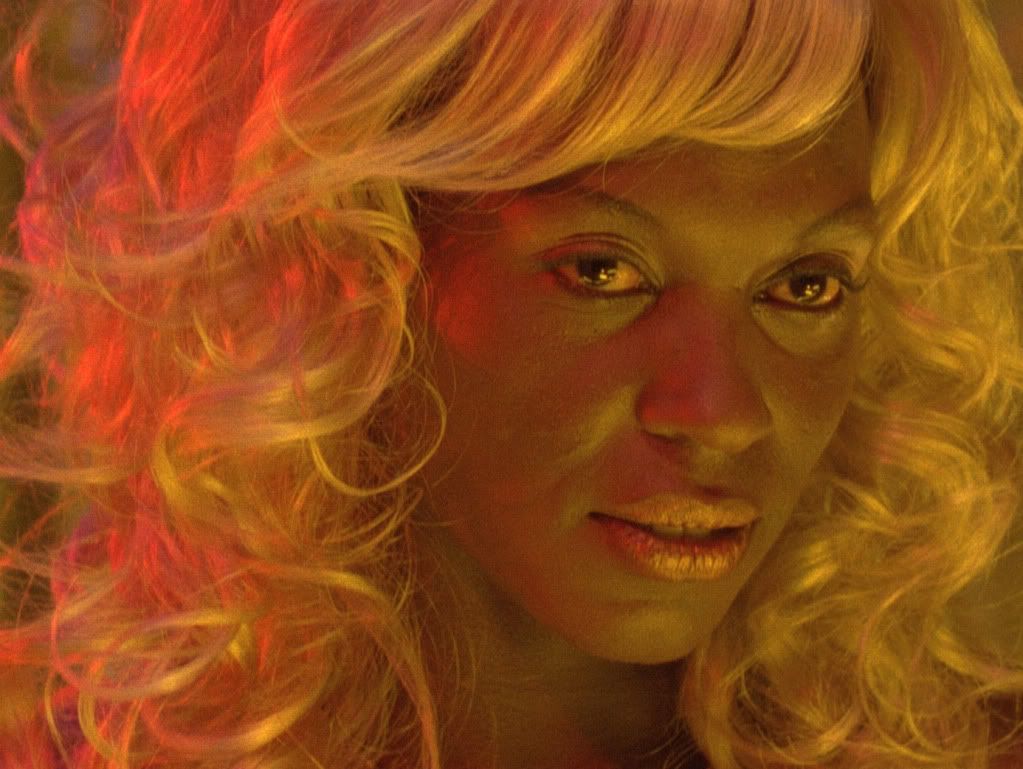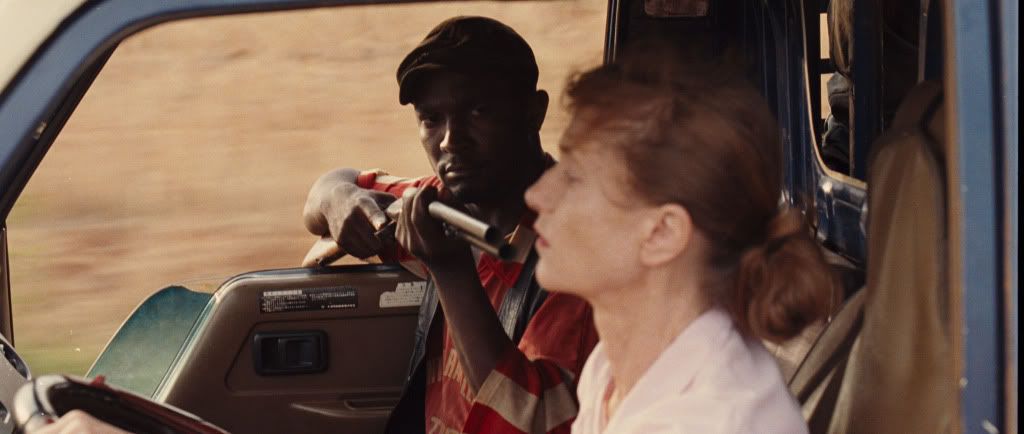Viewing Log #43, SFIFF53 #4: The word happy is sad [4/26/10 - 5/2/10]
by Ryland Walker Knight


—Hey ladies!
- Cyrus [Duplass Brothers, 2010] I laughed my butts off and thought all the zooms actually served a purpose in the general uncomfortable zone of these dudes' idea of comedy: one premised on miscommunication and lies and making people squirm. Jonah Hill does deadpan better than most, and maybe better than "wacky" (though his "wacky" in Superbad is pretty great); Marisa Tomei is a babe, still, and this wows me along with every other drooly idiot boy in the audience; guess that's the point, too, since John C Reilly's all wide eyes and goofy "Love! Me!" freak outs most of the way. I'd say see it in theatres if only because that'll probably mean you'll see it with a crowd and being drunk in a crowd of similarly inebriated, jazzed young people definitely added to my pleasure.
- I Am Love [Luca Guadagnino, 2009] In one light (the wrong one, duh), this is the silliest movie ever. But in the right light, it's one of the most beautiful: everything baroque expression, an all-caps film brimming with canted angles and swoons and tilts and a score to die for all around Tilda's face. As much a film of affect as INLAND EMPIRE, but to practically opposite ends, with damn near opposite means. That is, both filmmakers score their images to sound how they look but Lynch makes mud cakes with a grin while Guadagnino crafts gourmet plates for twenty with tears. Put otherwise, all the images drip and some rack focus fast and everything's lit to look delicious. I can't wait to see it again. Wish I could see it with a Vitti (or a Tilda, hell) wrapped around me, fingers locked. I'll likely write a real essay when it comes out in wide release.
- Senso [Luchino Visconti, 1954] I made a joke on twitter about how I was bored, then I qualified that with a (still-reductive) explanation that I did like the opening—I'm a sucker for stages, and audiences—and the abruptness of the ending, but otherwise I didn't need it or its tableaux of "hurt" or all that "hysteria." And, call me crazy, but I go crazy watching those mouths move out of synch with the soundtrack. Further: the colors are nice, no doubt, but the restoration, which seemed muddied in spots, paled in comparison with the Ray from the day before, which was crisp like new. Could be a print traffic thing, but it seemed more like a print striking thing.
- To Die Like a Man [João Pedro Rodrigues, 2009] A real film. Maybe not as great as I want it to be, and surely hard to handle in a lot of spots, but boy does it have style. At the Q+A, Rodrigues said he wanted to structure it as a musical comedy but that it was also inspired by Raoul Walsh's Objective, Burma!, which you can sense looking at this scene, but, to be fair, Rodrigues doesn't film any clouds the way Walsh does. What he does film, though, he films especially well. And we all know I'm a sucker for films about performance, and acting, and acting in the world in whatever determination that takes.
- The Music Room [Satyajit Ray, 1958] Caveat: got no sleep because of an airport run, so I dozed a few times. The restoration was beautiful. The film's craft was, too. But I tell you what: I'm kind of done with hubris. Doesn't feel tragic.
- Wild Grass [Alain Resnais, 2009] # At home, looking for images. Image-essay likely coming.
- White Material [Claire Denis, 2009] Didn't want to believe my buddies who'd seen it previously but, well, yes: this is not her finest two hours. Still ratcheted tight, and a few edits are jarring in the best ways, and murder by machete in any iteration is always terrifying, brutal, gross. Wish there were more ideas, and a better screenplay, but as it is there's just one and a kind of tired narrative structure. The filmmaking structure, however, proves its worth in its angles at end points and the camera's near hush. Every image seems stolen, as if they lucked out every time they turned the camera on and pointed it at things or didn't. The problem, though, with everything pointed inwards, is that it kind of cancels itself, proves its own null. I don't need Claire Denis to tell me about this kind of cesspool.
- Wild Grass [Alain Resnais, 2009] Had me from the get-go all the way up and down and around its folles follies to that finale that loops and dips and scans and pushes and soars and zooms and just feels great all inside my body and my brain. Danny was right: maybe the most generous. Dense, as ever, and "typically French," as many numbskulls said walking out, but I see those things as positives. Mileage varies, sure, but when you're flying you cover so much ground!
- Cold Weather [Aaron Katz, 2010] So much fun. Somehow didn't expect it to be plain entertaining, but it was, and I really had a fun time with it. Since Aaron's a friendly acquaintance, I know I'm a little biased, but I don't think that fraternal thing is necessarily a part of what I dug. More so I loved that it wanted to be, and rightly is, a comedy at heart. Cris Lankenau and Trieste Kelly Dunn really play off one another well, seem to have fun in every scene (even the deadpan, annoyed ones), and I bet a lot of siblings will enjoy seeing this together. Also, Brendan was pretty funny in his cameo. I hope everybody involved gets a spring board off this project.
- Father of My Children [Mia Hansen-Løve, 2009] What a lovely little film. Shows a family resemblance to plenty of her country's best, including Pialat (elisions, candor) and Doillon (children and their brains), though her interest in ladies and the importance of being a lady dealing with the weight of men, even as ghosts, is distinctive and maybe even singular. I'll see it again and I'll see her first and I'll write more.

—Drive, die




Woa I never paid Walsh much attention, but in that sequence he sorta beats Sam Fuller at his own tight-closeup game. Or just had a better editor. It builds and then pops, mercifully without the usual jingo-parade music. I saw To Die Like a Man at NYFF and can see the war-movie intent, in retrospect. There are some cuts that land like Walsh's grenades, usually the ones of pneumatic or sagging "female" body parts.
ReplyDeleteSaw two thirds of White Material also at NYFF, before running to another screening. Agree that it stews in its juices a bit too much, but so has every Denis film I've seen. She leans on her ability (usually with Agnes Godard's low light and shallow DOF, but here with another shooter) to render flesh tones and silently smoldering moods in something like 3-D. I would like to see her hitched to a propulsive, commercial narrative, some stray genre behemoth. Her Dark Knight would have mad $2 but it would have ultimately influenced a generation of dunderheads who can no longer see/read faces enough to appreciate the power of something like that Objective Burma scene. (Ho'wood needs the French, their bluesy way with plot and character but so far it jjust import their action meathead directors, shepherded by auteur turned franchise proprietor Luc Besson. But I digresss....)
Wild Grass. The only thing that interrupted my infatuation with that movie was falling in love with Love Streams a few weeks ago.